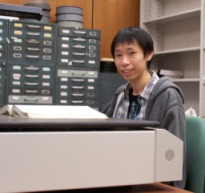Vanvi Trieu, Student Employee of the Month
by Alice Bampton
 Phylis Wright, manager of access desk services, announced that Vanvi Trieu was selected as student employee of the month for January, 2012.
Phylis Wright, manager of access desk services, announced that Vanvi Trieu was selected as student employee of the month for January, 2012.
Wright said, “Vanvi is a senior this year and he has worked for the Digital Library since he was a freshman. … Although he is quite busy as an engineering student, he has always made time to work a few hours a week for us because he enjoys the job. In addition to scanning, Vanvi also assists Bente [Polites, Special Collections librarian,] with Special Collections tasks.”
 Laura Bang, the Special and Digital Collections curatorial assistant who supervises Vanvi in the Digital Library, commented, “Vanvi is a careful and efficient student worker (very important for the fragile materials we deal with) and a friendly person. He is a pleasure to work with!”
Laura Bang, the Special and Digital Collections curatorial assistant who supervises Vanvi in the Digital Library, commented, “Vanvi is a careful and efficient student worker (very important for the fragile materials we deal with) and a friendly person. He is a pleasure to work with!”
Vanvi, a senior civil engineering major from Philadelphia, has tutored underclassmen and volunteered for events hosted by the Campus Activities Team. He enjoys a variety of hobbies: making/editing videos, “PhotoShopping” pictures, creating paper craft art and modifying or making iconic items from video games.
He says, “I think being an engineering student changed my biological clock and turned me into a nocturnal person. …[N]othing beats having a full course of ‘breakfast’ with lots of bacon as a midnight meal.”
Look for the caricature of Vanvi created by Joanne Quinn, Falvey’s design specialist, to be displayed on the pillar behind the main service desk.
 Schizophrenia is a dangerous disease — “like a death sentence,” as Bernard J. Gallagher III, professor of Psychiatric Sociology in the Department of Sociology and Criminal Justice, explains. For over 20 years, Dr. Gallagher and his Villanova University research team have sought to uncover the hidden causes of schizophrenia.
Schizophrenia is a dangerous disease — “like a death sentence,” as Bernard J. Gallagher III, professor of Psychiatric Sociology in the Department of Sociology and Criminal Justice, explains. For over 20 years, Dr. Gallagher and his Villanova University research team have sought to uncover the hidden causes of schizophrenia.